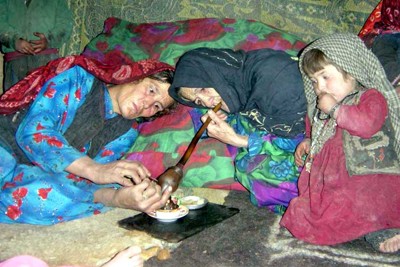As Afghanistan battles to check growing poppy production, there thrives a disturbing trend behind the scene, where daughters of poppy producers pay the price for the unpaid loans.

Ministry of Counter Narcotics and U.N. Office on Drugs and Crime, found nearly 1 million addicts in this nation of about 30 million people, including 60,000 children under age 15.
Termed as "opium brides", the daughters of poor poppy farmers are often given to drug traffickers if their fathers are unable to pay the loan taken for growing the illicit crop because of the official action.
In a report in its upcoming issue, Newsweek takes the case of an illiterate poor farmer in Laghman Province who borrowed US$ 2000 from a local traffickers promising to pay back with 24 kilos of opium at harvest time.
But officials destroyed his two and half acre poppy farm.
Unable to pay, he fled but was located by the trafficker and then village elders decided that he should give his 10-year old daughter to 45-year old trafficker to settle the debt.
''It is my fate,'' she told the magazine. She had desired to be become a teacher. Afghan call these girls ''loan brides'' and their number is increasing since the opium eradication programme began.
The practice, explains the magazine, began with the dowry a bridegroom's family traditionally pays to the bride's father in tribal Pashtun society.
These days the amount ranges from US$3000 or so in poorer places like Laghman and Nangarhar to US$8000 or more in Helmand, Afghanistan's No 1 opium-growing province.
All the same, local farmers were quoted as saying that a man can get killed for failing to repay a loan.
No one, the magazine says, knows how many debt weddings take place in Afghanistan, where 93 per cent of the world's heroin originates.
But Afghans say the number of loan brides keeps rising as poppy-eradication efforts push more farmers into default.
"This will be our darkest year since 2000," says Baz Mohammad, 65-year old former opium farmer in Nangarhar was quoted as saying.
''Even more daughters will be sold this year.'' The old man lives with the anguish of selling his own 13-year-old daughter in 2000, after Taliban leader Mullah Mohammed Omar banned poppy growing.
"Lenders never show any mercy," he said. The local farmers are quoted by Newsweek as saying more than one debtor has been bound hand and foot, then locked into a small windowless room with a smoldering fire, slowly choking to death.
While law enforcers predict yet another record opium harvest in Afghanistan this spring, the magazine says most farmers are struggling to survive.
An estimated 500,000 Afghan families support themselves by raising poppies, according to the UN Office on Drugs and Crime.
Last year, those growers received an estimated USD one billion for their cropsabout USD 2,000 per household. With at least six members in the average family, opium growers' per capita income is roughly US$ 300.
The real profits go to the traffickers, their Taliban allies and the crooked officials who help them operate.



